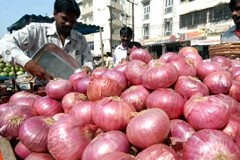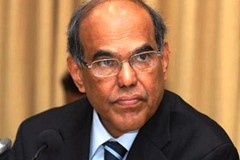Inflation in India
Rising onion prices often lead to politicians' tears

Onions are the symbol of Indian cooking, providing the bedrock of cuisine. It is the vegetable of the people, and when its price begins to rise, so do tensions in this hot-blooded country.
Politicians do not forget how, in January 1980, Indira Gandhi used the drama of rising onion prices to march back into power. Never one to miss an opportunity to stir the emotions, she would wave massive strings of the vegetables at campaign rallies. A government that cannot control the cost of onions is not worthy of being in power, she said.
A generation later, 1998 saw both a sixfold increase in the price of onions in Delhi and the fall of the state’s ruling government as a result.
And two years ago, wary of historical precedent, Manmohan Singh’s administration acted quickly and forcibly to ban onion exports, scrap import taxes and even send for onion supplies from Pakistan. The reason: the threat of a poor onion yield.
This year, with a national food inflation rate running at around 12%, the price of food supplies might have been growing across the board, but the onion has seen more dramatic price increases than any other staple, according to recent government figures.
Onion prices have more than doubled since the start of the year. Whereas a kilo of onions would cost Rs10-15 from a roadside stall in December, customers are paying as much as Rs28-40 per kilo today.
The western state of Maharashtra has traditionally served as one of India’s food bowls, but traders there say that prices are on the rise because of erratic weather, the late arrival of supplies, sustained demand and rising production costs.
But as so often is the case in India, there have also been suggestions by the Competition Commission, India’s fair trade regulator that traders’ cartels and hoarding have played a part in increasing the cost of onions, of which 15m tonnes are usually consumed each year.
Delhi's chief minister, Sheila Dikshit, has told the food and civil supplies department to "take action against hoarders", while the national railways minister has promised more wagons to speed up supplies.
Onions may not be a vital source of nutrition but they are seen as essential to spice-loving palates, which—when dissatisfied—can play a crucial hand in politics.
And with low income groups, which form the majority of the population, spending a substantial part of their earnings on food, it is time for the politicians to start worrying again—not least as the Congress-led government prepares to campaign for a third consecutive term in office in the general election early next year.
















